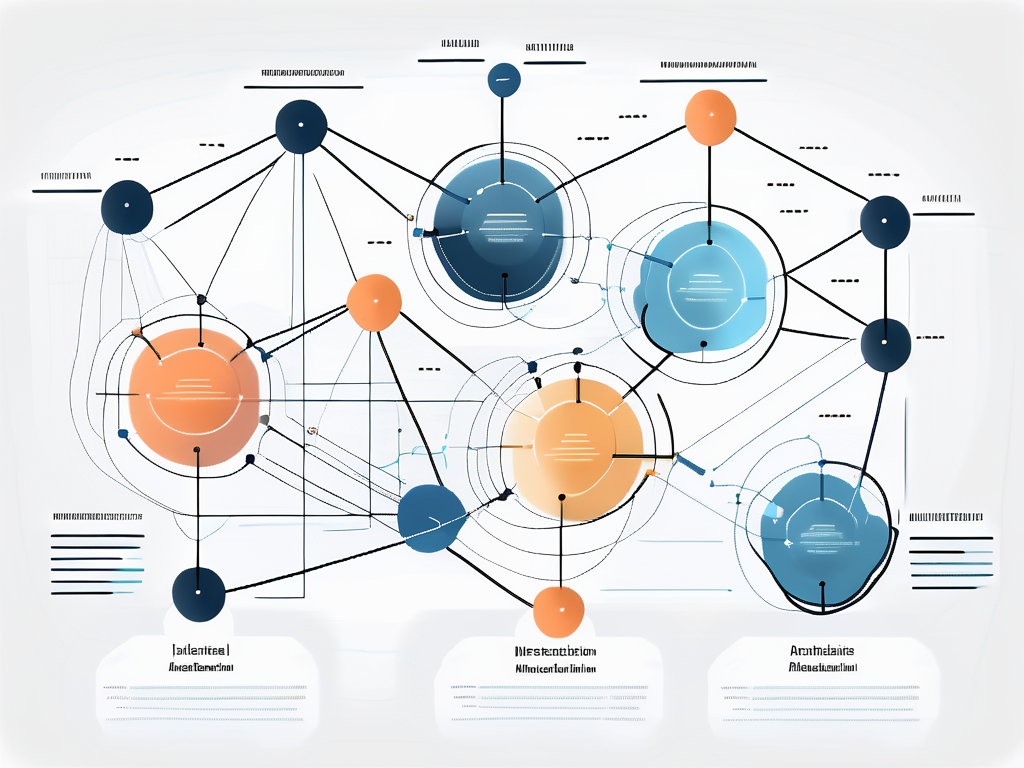In today’s rapidly changing business landscape, the impact of data science and data analytics cannot be overstated. These fields have revolutionized the way organizations make decisions, optimize operations, and gain a competitive edge. By harnessing the power of data, companies are able to unlock valuable insights and drive business growth like never before.
Understanding the Basics of Data Science and Data Analytics
To fully appreciate the impact of data science and data analytics, it is essential to understand their fundamentals.

Data science and data analytics are at the forefront of the digital revolution, playing a crucial role in shaping the future of industries across the globe. These fields harness the power of data to drive innovation, enhance decision-making, and create value.
Defining Data Science and Its Importance
Data science is a multidisciplinary field that combines computer science, statistics, and domain expertise to extract knowledge and insights from data. It involves various processes such as data collection, cleaning, analysis, and visualization.
Within data science, there are specialized areas such as machine learning, artificial intelligence, and big data analytics, each offering unique tools and techniques to derive actionable insights from complex datasets. Data scientists play a pivotal role in transforming raw data into strategic information that can drive business growth and innovation.
The importance of data science lies in its ability to uncover patterns, trends, and correlations hidden within vast amounts of data. By leveraging these insights, businesses can make informed decisions, identify new opportunities, and mitigate risks.
The Role of Data Analytics in Business
Data analytics focuses on the interpretation and communication of data to support decision-making. It involves the use of statistical analysis, predictive modeling, and machine learning techniques to extract meaningful information from raw data.
In the business context, data analytics enables companies to gain a deeper understanding of customer behavior, streamline processes, and optimize resource allocation. It empowers organizations to identify areas of improvement, make data-driven decisions, and achieve measurable outcomes.
Moreover, data analytics plays a crucial role in shaping marketing strategies, enhancing operational efficiency, and driving innovation within organizations. By leveraging advanced analytics tools and techniques, businesses can gain a competitive edge in the market and adapt to changing consumer preferences effectively.
The Intersection of Data Science and Business
As data science and business converge, we witness a transformative impact on various aspects of organizations. This intersection represents a dynamic synergy where data-driven insights are driving strategic decision-making and operational efficiency.
In addition to revolutionizing business operations, the integration of data science and business is reshaping the landscape of customer engagement and market dynamics. Companies are leveraging data analytics to gain a competitive edge, anticipate market trends, and customize their offerings to meet evolving consumer demands.
How Data Science is Transforming Business Operations
Data science has revolutionized business operations by automating processes, predicting demand, and enhancing efficiency. Through techniques such as machine learning and artificial intelligence, companies can automate repetitive tasks, optimize supply chains, and improve predictive maintenance. This transformation is not only streamlining operational workflows but also fostering innovation and agility within organizations.
By leveraging advanced analytics, businesses can gain real-time insights into their operations, identifying bottlenecks, and implementing proactive measures for optimization. Data-driven approaches enable organizations to make faster, more accurate decisions, leading to improved productivity and cost savings. The integration of data science in business operations is paving the way for a new era of efficiency and competitiveness.
The Influence of Data Analytics on Business Decisions
Data analytics has become a cornerstone of effective decision-making in business. By analyzing historical and real-time data, organizations can make informed choices, develop data-driven strategies, and measure the impact of their decisions. This data-centric approach empowers businesses to adapt to changing market conditions, mitigate risks, and capitalize on emerging opportunities.
Furthermore, data analytics enables businesses to personalize their offerings, tailor marketing campaigns, and optimize customer experiences. By understanding customer preferences and behavior, companies can deliver targeted solutions, build brand loyalty, and ultimately drive revenue growth. The strategic integration of data analytics in decision-making processes is fostering a customer-centric culture and driving sustainable business growth.
The Impact of Data Science on Various Business Sectors
Data science has made a significant impact across several industries, enabling organizations to derive value from their data and stay ahead of the competition.

Data Science in Retail and E-commerce
Retailers and e-commerce companies leverage data science to understand customer preferences, optimize pricing strategies, and improve inventory management. By analyzing customer behavior, purchase patterns, and market trends, companies can offer personalized recommendations, optimize product placement, and increase sales.
Additionally, data science enables retailers to forecast demand, optimize supply chains, and reduce costs. By accurately predicting customer demands and optimizing inventory levels, companies can minimize wastage, ensure product availability, and enhance customer satisfaction.
The Role of Data Analytics in Healthcare Industry
Data analytics plays a crucial role in the healthcare industry, driving advancements in patient care, diagnosis, and treatment. By analyzing medical records, patient outcomes, and research data, healthcare providers can identify patterns, predict disease progression, and develop targeted treatment plans.
Furthermore, data analytics empowers healthcare organizations to implement proactive measures for disease prevention, early intervention, and population health management. By leveraging insights from diverse sources of data, healthcare providers can improve patient outcomes, optimize resource allocation, and reduce costs.
Moreover, data analytics has revolutionized the field of medical research. By analyzing large datasets, researchers can identify potential risk factors, discover new treatments, and contribute to medical breakthroughs. For example, data science has played a crucial role in the development of precision medicine, where treatment plans are tailored to an individual’s genetic makeup and specific health conditions.
In addition, data analytics is transforming healthcare operations and administrative processes. By analyzing data on patient flow, resource utilization, and operational efficiency, healthcare organizations can identify bottlenecks, streamline workflows, and improve overall productivity. This not only enhances patient experience but also reduces costs and improves the quality of care.
Challenges and Solutions in Implementing Data Science and Analytics
While the potential benefits of data science and analytics are immense, organizations face various challenges when implementing these practices.

One significant challenge that organizations encounter is the integration of data science and analytics tools into their existing infrastructure seamlessly. This process often requires substantial changes to IT systems, data storage mechanisms, and workflow processes. Organizations must carefully plan and execute these integrations to ensure minimal disruption to operations while maximizing the efficiency and effectiveness of their data initiatives.
Overcoming Data Privacy and Security Concerns
Data privacy and security are critical considerations in the era of data-driven decision-making. Organizations must ensure compliance with data protection regulations and implement robust cybersecurity measures to safeguard sensitive information.
By adopting robust encryption techniques, conducting regular security audits, and implementing access controls, organizations can mitigate the risks associated with data breaches and protect their reputation.
Furthermore, organizations need to stay abreast of evolving data privacy laws and regulations to adapt their security protocols accordingly. This proactive approach not only enhances data protection measures but also demonstrates a commitment to ethical data handling practices, fostering trust among customers and stakeholders.
Addressing the Skills Gap in Data Science and Analytics
The demand for skilled data scientists and analysts far outweighs the supply. To address this skills gap, organizations can invest in employee training programs, collaborate with academic institutions, and foster a culture of continuous learning.
Moreover, organizations can leverage external expertise by partnering with data science consultancies or hiring freelancers to support their data initiatives. By building a diverse and multidisciplinary team, organizations can accelerate their data science journey and maximize the impact of data analytics.
It is also essential for organizations to provide ongoing professional development opportunities for their existing data science teams to keep their skills sharp and up-to-date with the latest industry trends. Encouraging knowledge sharing and collaboration within the team can further enhance problem-solving capabilities and innovation in data-driven projects.
The Future of Data Science and Data Analytics in Business
As we look ahead, the future of data science and data analytics in business holds immense promise and potential for further innovation. With the rapid advancements in technology and the increasing availability of data, businesses are poised to leverage these resources to gain a competitive edge and drive success.
Emerging Trends in Data Science and Analytics
Emerging technologies such as big data, cloud computing, and artificial intelligence are shaping the future of data science and analytics. Companies are increasingly adopting cloud-based analytics platforms, exploring the potential of edge computing, and investing in AI-powered algorithms to gain a competitive advantage.
But the future goes beyond just these technologies. The integration of Internet of Things (IoT) devices and data analytics is also poised to revolutionize industries such as manufacturing, energy, and transportation. By capturing and analyzing real-time data from connected devices, businesses can optimize processes, monitor equipment performance, and drive operational efficiency. Imagine a manufacturing plant where every machine is interconnected, constantly feeding data into a central analytics system that can predict maintenance needs, optimize production schedules, and reduce downtime.
Predicting the Future Impact of Data Science on Business
Looking further into the future, data science is likely to continue transforming business operations, driving innovation, and shaping business strategies. Organizations that prioritize data literacy, invest in technology infrastructure, and foster a data-driven culture are well-positioned to thrive in the digital age.
But what does this mean for businesses? As data becomes increasingly pervasive, businesses that can harness its power and unlock actionable insights will gain a competitive edge. Imagine a retail company that can analyze customer data to personalize marketing campaigns, optimize inventory management, and predict customer preferences with remarkable accuracy. Or a healthcare organization that can leverage data analytics to improve patient outcomes, identify patterns in disease outbreaks, and optimize resource allocation.
The impact of data science and data analytics in the business world is likely to be profound, shaping the way companies operate, innovate, and drive success in the years to come. The possibilities are endless, and the businesses that embrace this future will be the ones that thrive in the ever-evolving landscape of data-driven decision-making.

Leave a Reply